


In a new economy, how islanders are educated and what the curriculum will involve is crucial - whether it may include coding, economics or bringing STEM and the arts together.
Last week, a group of islanders called the Economic Council published a document called 'New Perspectives' setting out five themes which they believe should help form a long-term vision for our economy. Finishing today, Express is publishing more details on each one of those themes...
Unless Jersey innovates and aspires to the highest levels in education and skills development across our entire population, our economy will not prosper.
A world-class education system is fundamentally crucial to the future prosperity of our community and building back better. The island’s primary economic resource is the intellect and creativity of its people, which over the last 60 years has been so successful in establishing Jersey as a word class financial centre, and innovating our traditional industries of agriculture (including aquaculture) and hospitality.
But we need to ensure that we develop a talent pipeline that supports our future economic strategy.

Pictured: "A world-class education system is fundamentally crucial to the future prosperity of our community and building back better."
Education underpins each of the four strategic drivers already outlined by the Economic Council, with the Council focusing its ambition for ‘education and skills’ around innovation and creativity.
It is essential that (i) the island educates children and young people for the working world they will enter, one that aligns with our economic strategy; and (ii) beyond primary and secondary education, the Island must adopt and embrace a culture of lifelong learning, anchored by a further/higher education system that focusses on skills necessary to empower our workforce to thrive in the new economy.
This will be how the island develops and maintains a strong talent pipeline, encouraging entrepreneurs and enterprises to build and grow businesses in the island, and in turn driving our future economic success.
The Economic Council considered that:
in both cases, where the concept of ‘fail fast’ is embraced, understood politically, and no longer translated by the local media into negative front-page headlines that risks suffocating innovation or, worse still, driving it away.

Pictured: "Creative subjects such as art and music are brought together with STEM to help inspire a new generation to be innovative as well as problem solvers."
The pace of change referred to was reinforced in a recent report published in July 2020 by PwC Channel Islands entitled ‘Up-skilling the Channel Islands’ workforce for a digital world’, within which it was noted that almost 17,000 jobs in Jersey were at risk of loss by 2035 due to automation, with jobs in our financial services sector being at greatest risk.
Jersey will have to reinvent itself again and having the resources to retrain our workforce is a vital investment to successfully navigate that change. In the foreword to the PwC report, Nick Vermeulen, Innovation and Technology Partner says:
“If governments, businesses and educators don’t take decisive action now, the jobs that are furloughed or lost in the downturn may never come back. In turn, posts at risk of automation in 5-10 years’ time could disappear much sooner as restructuring and cost-saving accelerate in the wake of the pandemic.
“Yet this is also a once in a generation opportunity. With right skills, agility and readiness to embrace change, the Channel Islands can create thousands of new jobs to make up for the ones that will be lost. We can attract new businesses with new ways of working, improve the quality and value of the work we do, make it more fulfilling and ultimately bolster the long-term competitiveness and prosperity of our islands.”

Pictured: "It was noted that almost 17,000 jobs in Jersey were at risk of loss by 2035 due to automation, with jobs in our financial services sector being at greatest risk."
The link between education and our economic prosperity is not a new concept, but perhaps there has not been a burning platform to drive the necessary strategic change – before now.

Pictured: The Skills Strategy Report from the University of Exeter said - "We also need to boost the attractiveness of our priority sectors to young people and promote workforce development and lifelong learning to ensure that skills keep up with the pace of change."
Whilst there is an excellent understanding of the issue of education and skills locally, and research has been done, the question is how to corral and adequately resource our Education Department, Skills Jersey, other Government departments, bodies and agencies, and to effectively partner the private and third sectors, to action this critical initiative – the issue having been amplified by the Covid-19 pandemic as articulated by PwC.
As a further provocation to deal with this issue, longer lives will almost certainly mean longer working lives. In their book ‘The 100-Year Life’, Lynda Gratton and Andrew J Scott note that a child born in the West today has more than a 50% chance of living to the age of 105, which they contrast with a child born over a century ago when the chance of living that long was 1%. They argue that retirement ages of 80 will end up being common because retirement at 65 will simply be a financial impossibility.
They say: “It may be that over a 100-year life substantial knowledge acquisition will no longer take place in one shot, completed early in life. Given the degree of likely technological advances, it seems impossible to imagine that a specialism learnt early in a career will sustain someone through their long working life.”
“There is likely to be a rise in the importance of education that supports the creation of ideas and the value of being innovative and creative.”

Pictured: "Longer lives will almost certainly mean longer working lives."
Further evidence that support for the creative industries is a must have rather than a nice to have.
So, education in Jersey must support older people retraining whose jobs will otherwise disappear due to disruption from technology, competition or both, a fact supported by 75% of respondents to the 2019 Jersey Annual Social Survey.
As part of a cohesive strategy we need to invest in apprenticeships and in developing younger (and older) talent to ensure the island is self-sustaining and has a diverse workforce able to maintain and develop the local economy.
Nothing in this essay is intended to criticise the efforts of those that work in education in Jersey; quite the contrary, the Economic Council gratefully acknowledges what is currently being achieved with the available resources.
We simply make the case that Jersey should have an ambition to have the best education in the world and work-up a viable plan to deliver on that ambition. The future prosperity of our community depends on it. Government now needs to devote the resources to establishing that ambition and a supporting theory of change. As citizens, parents and even grandparents we have the most important part to play in recognising the importance of life-long learning.

Pictured: "For example Highlands College, can be positioned to support innovation and the skills needed to exist and thrive in the new economy in a broader way."
Other strategic drivers that have been put forward by the Economic Council refer to education and ask whether and how some of our existing resources, for example Highlands College, can be positioned to support innovation and the skills needed to exist and thrive in the new economy in a broader way, linking-up with other arms-length organisations that themselves promote further education, skills and lifelong learning.
A commitment to lifelong learning also represents a genuine opportunity for a sustainable partnership between the public, private and third sectors and the creation of a unique learning ecosystem. In this regard, we acknowledge the activities of many private and third sector organisations who already form part of an ecosystem that promotes lifelong learning to both local and international students.
These include the Digital Jersey Academy, multiple providers of professional qualifications and professional development in the financial services sector, as well as third sector organisations such as the ‘Durrell Conservation Academy’, who – from Jersey – are world leaders in conservation capacity development and whose conservation academy has trained thousands of students at all points of their career and has a globally important purpose: to provide the skills and experience to prevent further endangered species from becoming extinct.
These are cited as examples to demonstrate an existing education and skills development capability in the Island that exists beyond the Government’s own education system and should be leveraged and expanded upon to deliver the stated Vision of Skills Jersey, “A confident, motivated and skilled society for Jersey”, and a Mission that, "Local people of all ages have the ability to choose and achieve positive career, life and learning goals, aligning with the needs of the Island, in collaboration with industry”. The Economic Council could not have summed-up the strategic ask any better.
Read the full report here.
Jersey needs to literally... 'build better'
Why tech will change our economy forever